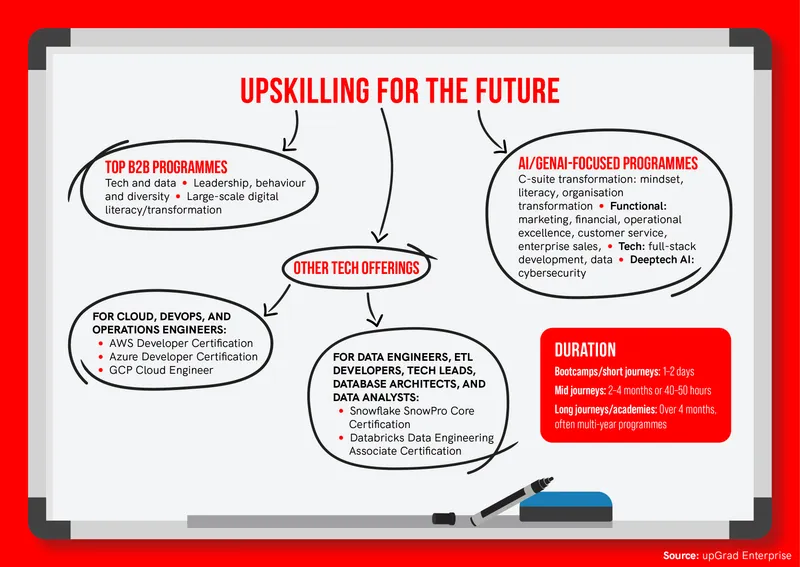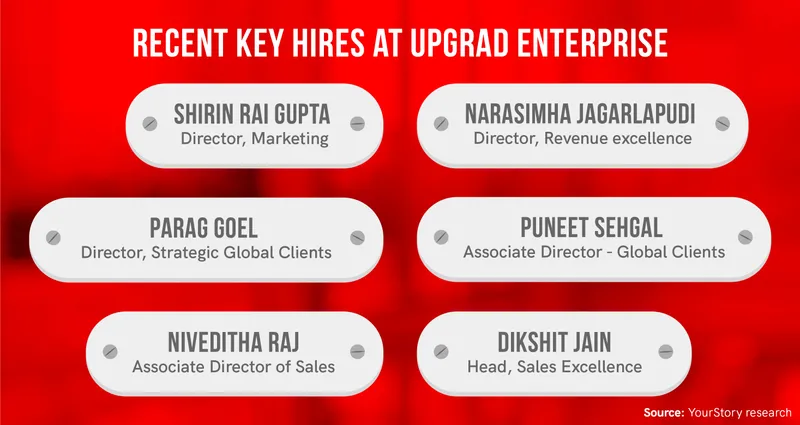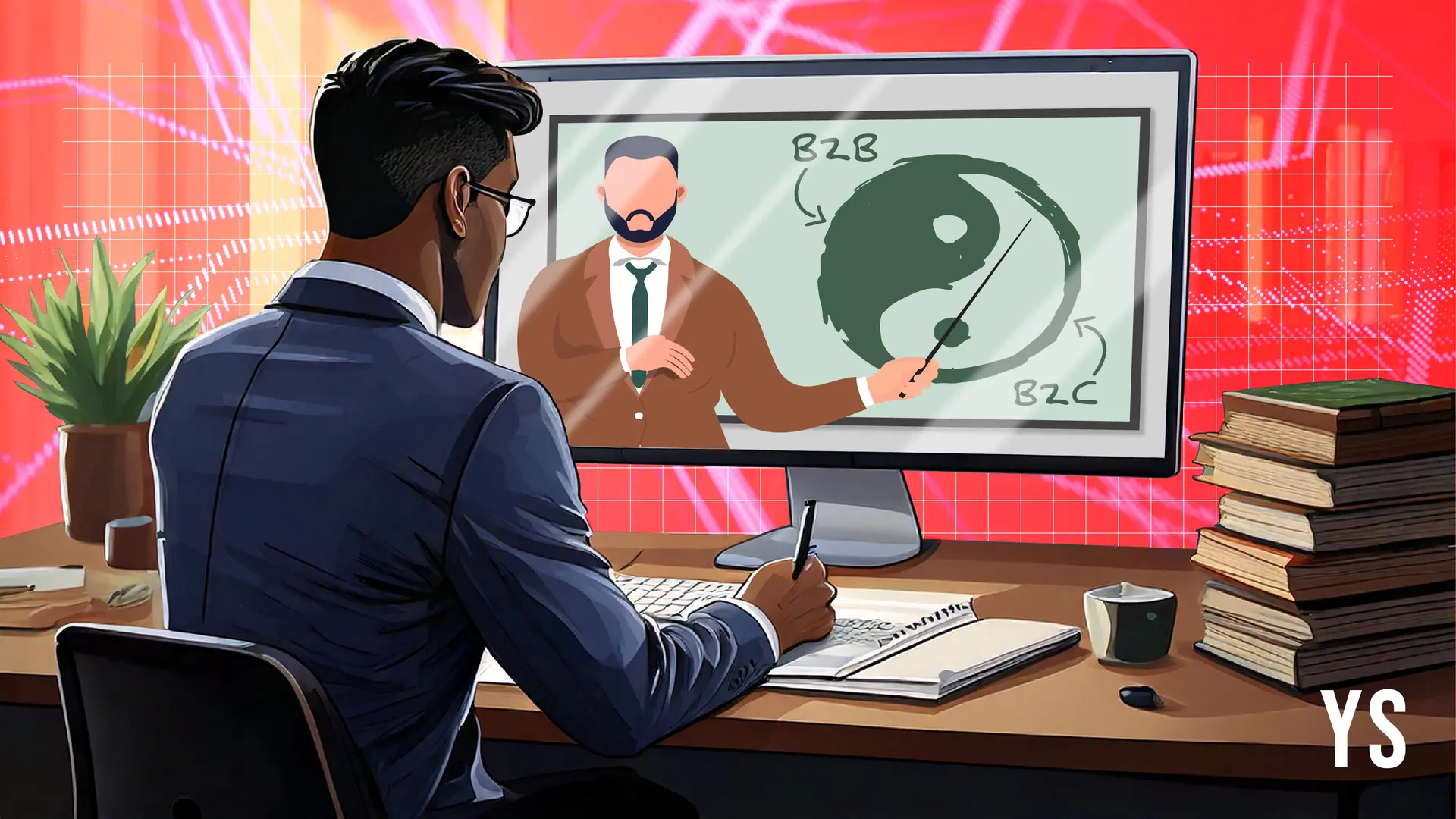B2B and B2C are the Yin and Yang of edtech biz: upGrad Enterprise CEO
upGrad’s enterprise arm has quickly emerged as a growth engine of the company, with the potential to surpass the consumer segment. However, both are integral to the business and complement each other, reiterates Srikanth Iyengar, CEO of upGrad Enterprise.
B2B or B2C? Which segment to place bets on? Where should the money go? These questions have confounded edtech firms for a long time now. But Srikanth Iyengar, CEO of upGrad Enterprise—the enterprise arm of upskilling platform upGrad—believes it is not an either-or decision anymore.
He views B2B (business-to-business) and B2C (business-to-consumer) as two sides of a coin, or Yin and Yang, as he likes to call them.
“B2C and B2B are in some ways Yin and Yang,” Iyengar tells YourStory in an exclusive interview. “B2B is an integral part of our business, and it complements what we have on the B2C side,” he adds.
Yin and Yang is a Chinese concept that describes two polar but interconnected forces that form a whole.
This may sound philosophical, and maybe even a tad poetic, but the enterprise CEO has firm conviction in the metaphor, which he repeatedly refers to—as he does not view the enterprise segment in isolation from upGrad’s overall operations.
Nearly a decade ago, the company entered the edtech space with a sharp focus on individual learners through its B2C platform, offering courses in data science, management, marketing, and technology.
Over the years, the edtech firm has added a few B2B initiatives, including upGrad for Business and Workforce Development, as well as Centum Learning, a corporate training platform, and Harappa Education, an online learning platform—both acquired in 2022. It was only in April this year that upGrad carved out a separate vertical for the enterprise segment, amalgamating its various efforts.
The rationale behind this is to create an “ecosystem” that meets both personal and corporate skilling needs, says Iyengar. B2C empowers individuals to enhance their careers, while B2B equips organisations to stay competitive, he adds.
Through the B2C segment, upGrad equips learners with knowledge in areas such as data science, machine learning, AI, cloud computing, and cybersecurity. For corporate executives, upGrad offers upskilling courses encompassing technical and leadership programmes and AI-centric modules.
While the B2C segment will remain the cornerstone of upGrad’s overall portfolio, its B2B arm has quickly emerged as a key growth engine of the company, with the potential to even surpass B2C in future, says Iyengar.
The enterprise arm may have been formed just nine months ago, but it’s already on a rapid trajectory.
upGrad enterprise is clocking robust revenue growth and is poised to become a major contributor to the company' overall profitability in the future. Currently, 20-25% of upGrad’s revenue comes from the B2B segment, while the rest is from the B2C space.
The B2B boost
Given the fluctuating fortunes of the consumer segment, many edtech companies have started diversifying their offerings in the last few years with a strong thrust on B2B.
Anil Joshi, Managing Partner of Unicorn India Ventures, puts this in perspective.
He believes the enterprise segment operates on demand-driven opportunities, making its revenue stream more predictable, unlike in the B2C segment, where upskilling is often an additional pursuit for learners.
“The B2B edtech business model is gaining traction and will continue to gain acceptance,” he says.
However, Joshi asserts that B2C will continue to remain relevant for professionals, providing upskilling opportunities at their convenience.
On the other hand, in a changing environment, many enterprises want to proactively invest in upskilling their employees, so their skills are better aligned with their business objectives. It also helps them retain talent in the long run.
While the B2C business is critical to upGrad’s business, the company is betting on the B2B segment for brand development, global expansion, and relationship building with clients.
“upGrad Enterprise is a great way for upGrad to become a truly global company across major markets, working with some of the biggest companies in the world,” says Iyengar.
According to reports, the firm's B2B skilling and reskilling business is turning profitable.
The enterprise segment is demonstrating strong year-over-year revenue growth, which is not only significant but also profitable, contributing meaningfully to the company’s overall bottom line, says Iyengar.
He also points out that the segment is “profit accretive” to the company—which means it generates more profit than what it costs to operate the business.
“We expect the enterprise business to be a higher profit entity than the consumer business,” he says but hastens to add that the consumer segment will still be the business with a bigger scale. And he doesn’t fail to reiterate that upGrad needs both Yin and Yang for sustained growth.
upGrad clocked a revenue of Rs 1,876 crore in FY24, which, after Ind-AS adjustments (Adjustments in Indian Accounting Standards), resulted in a total income of Rs 1,547 crore. It aims to touch a topline of about Rs 2,400 crore for the ongoing financial year, according to reports.
“In a couple of years, the enterprise business will be about 40% of upGrad’s revenue,” shares Iyengar, adding that the enterprise business is targeting at least 30-40% growth year-on-year.
However, achieving all this will not be easy as the enterprise segment will have to expand at a faster clip than the overall company.
upGrad has laid out a roadmap for long-term growth and profitability: the goals pertain to operational efficiency, continuous innovation, streamlining delivery, building a strong delivery network, prioritising learning outcomes, and building long-term relationships.
In FY25, the enterprise unit delivered training to over 350 clients, including large Indian corporates with global operations, major Indian tech services firms generating most of their revenue abroad, and some Fortune 500 companies.
The growth in its enterprise segment can be broadly attributed to three major factors—deeper relationships with clients; focus on tech, including data and AI; and global expansion, particularly in North America and Europe.

Infographic design: Nihar Apte
Building long-term relationships
upGrad Enterprise’s clientele includes global MNCs, tech and BFSI giants, leading American multinationals, and Fortune 500 companies.
Strategic collaborations are an integral part of the company’s B2B play. For instance, it has partnered with HCL Tech to co-create content and programmes focused on GenAI and allied technologies.
To deepen its relationships with existing clients, upGrad endeavours to expand its offerings to increase revenue per user and customer lifetime value, enhance customer loyalty, and improve operational efficiency.
The aim is to become the preferred partner for clients, thus accruing repeat business and referrals. In fact, 60-70% of upGrad Enterprise’s revenue already comes from returning clients.
AI will shape the future
According to industry experts, 2025 is likely to see a heightened emphasis on upskilling and reskilling, particularly related to AI, and upGrad is keen to seize the opportunity.
Iyengar is gung-ho about the prospects of AI and its implications on upskilling.
“I’ve had the privilege of working in tech-related businesses for almost 25 years, and if I look back, I can tell you that I've never been this excited after what was called the dot-com boom,” he says.
He emphasises that AI will not replace humans but will lead to the creation of a “human plus AI” era, marking an inflection point that will drive people to upskill themselves and transition to roles significantly different from those of today.
With generative AI (GenAI) impacting various stages of the business, there is sufficient interest from enterprises for integrated programmes that combine technology aspects with change management. It is crucial for both entry-level employees and mid-level managers to learn how to use AI tools and also understand how to drive transformation across business functions using these tools.
According to Iyengar, the enterprise programmes not only explain the foundational concepts of machine learning and AI but also highlight how businesses are using/expect to use GenAI, how the technology integrates into the broader landscape, and what unique capabilities and applications it brings to the table.
For AI-focused programmes and courses tailored around GenAI—where ideation and the ability to collaborate and adapt in real-time are critical—the company emphasises on hands-on interactive learning through small group activities and projects.
Many of these courses offer access to virtual labs developed in partnership with organisations like HCL and specialist assessment partners–they feature sandbox environments and synthetic data to simulate real-world use cases, ensuring practical, in-depth learning.
Expanding global footprint
The enterprise unit has leveraged its relationships in India to expand globally in regions like the US, UK, and Europe. It currently serves partners in over 20 countries and aims to double down on its global presence in the coming years.
The optimism in Europe and the US—the world’s largest skilling market—stems from economic stability, innovation, government support, and corporate focus on continuous learning.
The Middle East, including Saudi Arabia, Abu Dhabi, and Dubai, is also emerging as a growth area, thanks to the region’s investments in AI and building a tech-ready workforce.
“Many parts of the world are likely to be in a stronger position to invest as we enter the new calendar year, and we hope to see the benefits of that,” the enterprise chief says.
Around a quarter of upGrad Enterprise’s business comes from outside India, while three-quarters comes from within.
Iyengar anticipates a shift in this composition as global operations expand, driven by rising demand for AI courses in international markets. The company aims for at least 40% of its B2B learners to be based outside India in two years.

Infographic design: Nihar Apte
Sustaining growth momentum
To capitalise on its growth momentum, the enterprise unit is selectively investing in branding and marketing. It has also strengthened its team by onboarding senior leaders in sales and marketing.
The enterprise unit continues to hire mid and senior-level talent across sales, delivery functions, client-facing roles, global client engagement, consultative technology, and core tech.
upGrad, which competes with the likes of Eruditus, Great Learning, Simplilearn, Coursera, and Udemy in the skilling space, has around 4,000 employees. About 500 of them are in the enterprise unit; 54 people have been hired since April, of which 25% hold leadership positions.
Given the spate of layoffs in the edtech sector, upGrad is aware that it has to be prudent when it comes to recruitment. Even as it strengthens its enterprise team, the company is hiring carefully and selectively for specific roles, says Iyengar.
While the enterprise unit is growing rapidly, sustaining and scaling this momentum will be a challenge, especially as it seeks opportunities in multiple geographies. This involves understanding and tackling cross-border and cultural factors.
“Being very conscious of not offending people within cultural boundaries is critical. You have to make the skilling interesting—with a bit of humour, banter, and camaraderie. However, if not done right, that can cross the line,” the CEO notes.
He explains that learning styles vary from country to country: in India, learners are more inquisitive and participative, often leading to a chaotic environment in small groups; in Northern Europe, people are less boisterous but equally interested; and in the United States, learners expect concise, to-the-point skilling.
upGrad is tailoring its B2B offerings globally by incorporating localised case studies and emphasising region-specific workplace values and capstone projects and personalised learning with one-on-one mentorship and flexible delivery modes.
These outcome-oriented features ensure the curriculum meets the market demands in each geography, says Iyengar. The programmes are backed by over 3,000 trainers and skilling professionals who are experienced and can adapt to the unique aspects of different markets.
“As we work across let’s say 40 countries, as opposed to 20, we will be richer for the experience,” he signs off.
(Cover image and infographics designed by Nihar Apte)
Edited by Swetha Kannan









